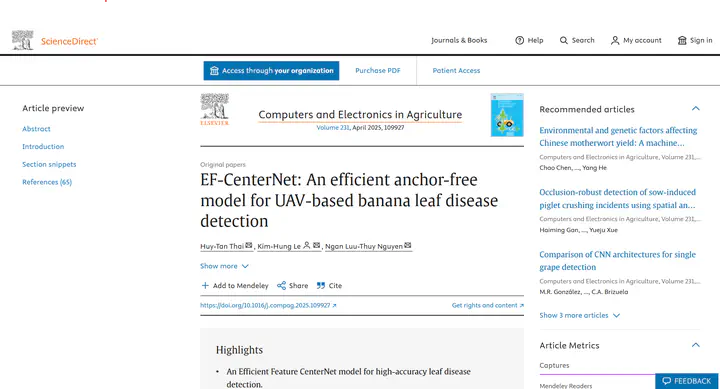Groundbreaking Research on UAV-Based Banana Leaf Disease Detection Published

A significant advancement in agricultural technology and artificial intelligence has been marked by the recent publication of a new research paper in the prestigious international journal, Computers and Electronics in Agriculture. We extend our heartfelt congratulations to first author, PhD Candidate Huy-Tan Thai from VNUHCM-UIT, and all co-authors for their invaluable contributions to this work. The paper, titled “EF-CenterNet: An efficient anchor-free model for UAV-based banana leaf disease detection,” was published in April 2025.
The research introduces EF-CenterNet, a novel and efficient anchor-free deep learning model designed for detecting banana leaf diseases using images captured by Unmanned Aerial Vehicles (UAVs). This model aims to provide a more accurate and timely method for identifying diseases in banana plantations, a critical aspect of modern precision agriculture. Key contributions of the study include the development of a lightweight yet powerful model that can be effectively deployed for rapid and large-scale monitoring of crop health, facilitating early intervention strategies.
The potential impact of this research is considerable, offering a sophisticated tool for farmers and agricultural specialists to combat banana leaf diseases, which can cause significant crop losses. By leveraging UAV technology and advanced AI algorithms, EF-CenterNet can enhance disease surveillance, leading to more sustainable farming practices, optimized resource management, and improved yields in banana cultivation. This study highlights the transformative role of AI-driven remote sensing in addressing pressing challenges in global agriculture and food security.
Our institution proudly acknowledges the innovative research and dedication demonstrated by PhD Candidate Huy-Tan Thai and the research team. We congratulate Huy-Tan Thai, Kim-Hung Le, and Ngan Luu-Thuy Nguyen on this important academic achievement. Their work not only pushes the boundaries of scientific knowledge in agricultural AI but also provides practical solutions for real-world problems, and we anticipate its positive influence on the field.